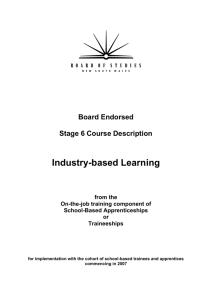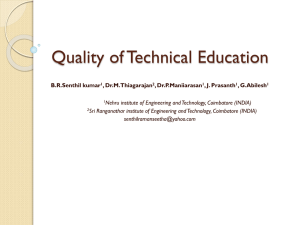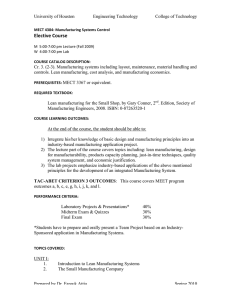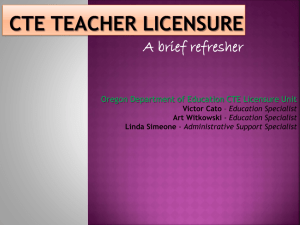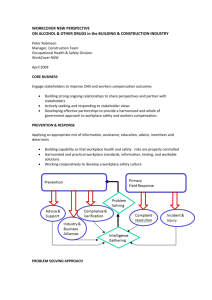Stage 6 Industry-based Learning Support Document
advertisement
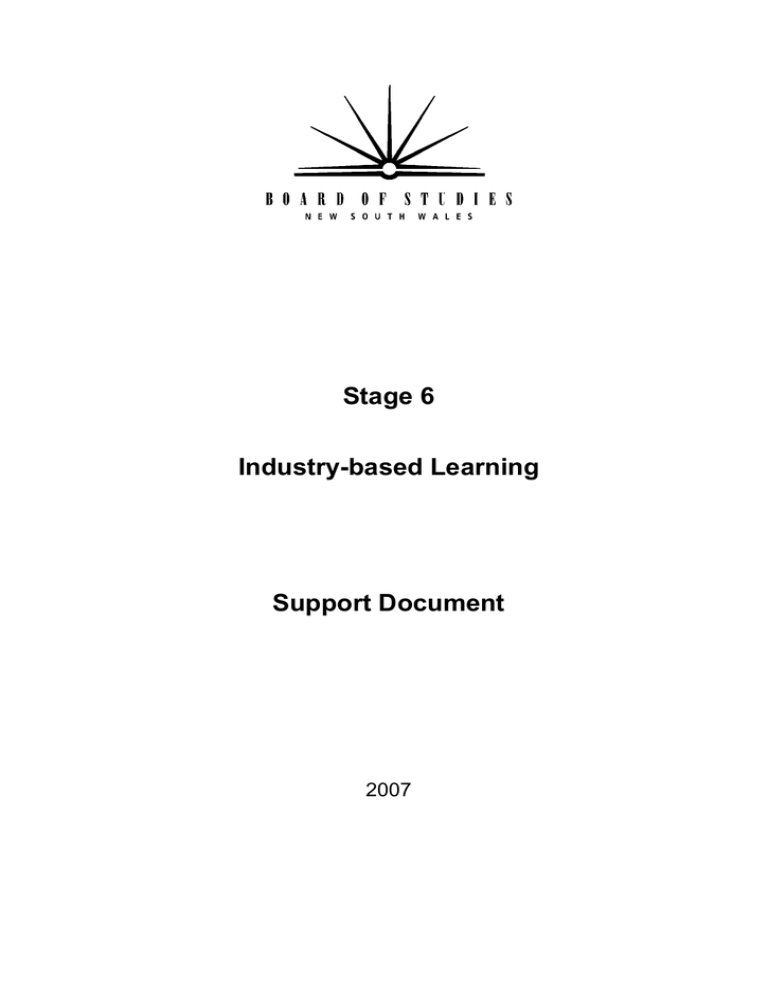
Stage 6 Industry-based Learning Support Document 2007 © 2007 Copyright Board of Studies NSW the for and on behalf of the Crown in right of the State of New South Wales. This document contains Material prepared by the Board of Studies NSW for and on behalf of the State of New South Wales. The Material is protected by Crown copyright. All rights reserved. No part of the Material may be reproduced in Australia or in any other country by any process, electronic or otherwise, in any material form or transmitted to any other person or stored electronically in any form without the prior written permission of the Board of Studies NSW, except as permitted by the Copyright Act 1968. School students in NSW and teachers in schools in NSW may copy reasonable portions of the Material for the purposes of bona fide research or study. When you access the Material you agree: • to use the Material for information purposes only • to reproduce a single copy for personal bona fide study use only and not to reproduce any major extract or the entire Material without the prior permission of the Board of Studies NSW • to acknowledge that the Material is provided by the Board of Studies NSW • not to make any charge for providing the Material or any part of the Material to another person or in any way make commercial use of the Material without the prior written consent of the Board of Studies NSW and payment of the appropriate copyright fee • to include this copyright notice in any copy made • not to modify the Material or any part of the Material without the express prior written permission of the Board of Studies NSW. The Material may contain third party copyright materials such as photos, diagrams, quotations, cartoons and artworks. These materials are protected by Australian and international copyright laws and may not be reproduced or transmitted in any format without the copyright owner’s specific permission. Unauthorised reproduction, transmission or commercial use of such copyright materials may result in prosecution. The Board of Studies has made all reasonable attempts to locate owners of third party copyright material and invites anyone from whom permission has not been sought to contact the Copyright Officer, ph (02) 9367 8289, fax (02) 9279 1482. Published by Board of Studies NSW GPO Box 5300 Sydney NSW 2001 Australia Tel: (02) 9367 8111 Fax: (02) 9367 8484 Internet: www.boardofstudies.nsw.edu.au ISBN 978 174147 7207 2007237 Contents 1 Industry-based Learning Stage 6 course ..............................................................................5 1.1 Introduction .................................................................................................................5 1.2 Course description ......................................................................................................5 2 Evidence of industry-based learning ....................................................................................6 2.1 Introduction .................................................................................................................6 2.2 Course outcomes .........................................................................................................6 2.3 Collection and presentation of evidence .....................................................................7 3 2.3.1 Industry-based learning log.............................................................................7 2.3.2 Industry-based learning journal ......................................................................8 Assessment of evidence of industry-based learning ..........................................................10 3.1 Assessment schedule/plan .........................................................................................10 3.2 Guidelines for assessment .........................................................................................10 4 Conferencing with students................................................................................................12 Appendix 1 Sample log ..........................................................................................................13 Appendix 2 Sample journal ....................................................................................................16 Appendix 3 Sample assessment schedule ...............................................................................20 Appendix 4 Sample schedule of meetings with supervising teacher ......................................21 Industry-based Learning Support Document 1 Industry-based Learning Stage 6 Course 1.1 Introduction The Board Endorsed course in Industry-based Learning gives students the opportunity to gain credit towards the NSW Higher School Certificate (HSC) for the ‘on-the-job’ component of school-based apprenticeships and traineeships. This HSC unit credit is in addition to the unit credit for the formal ‘off-the-job’ training that students already receive through their HSC VET courses. The Industry-based Learning course is available to students with an approved school-based apprenticeship or traineeship training contract who are also entered for the appropriate HSC VET course(s) for the formal off-the-job training component of the school-based apprenticeship or traineeship. This document, the Industry-based Learning Support Document, contains material and advice which is intended to assist teachers in the initial implementation of the course and monitoring of student evidence of learning related to the course outcomes. It must be read in conjunction with the Stage 6 Course Description. 1.2 Course description The Industry-based Learning Stage 6 Course Description contains advice about course eligibility and describes course outcomes, as well as requirements for course completion and assessment of evidence of industry-based learning. For HSC accreditation the delivery of this course must comply with the requirements described in this document. The Industry-based Learning Stage 6 Course Description is available on the Board’s website (www.boardofstudies.nsw.edu.au) under the ‘Vocational Education’ link. The course description can be downloaded from the following link: http://www.boardofstudies.nsw.edu.au/voc_ed/pdf_doc/Industry_based_learning.doc The school/teacher should ensure that the employer is aware of the requirements of this course and is able to support the student in achieving the course outcomes. 5 Industry-based Learning Support Document 2 Evidence of industry-based learning 2.1 Introduction The Industry-based Learning Course Description does not set out specific content that must be learned, how learning should occur or when it should be learned. Rather students must present evidence of the things they have learned while participating in the on-the-job component of their school-based apprenticeship or traineeship. The workplace is their ‘classroom’. This evidence is not in relation to achievement of units of competency as part of their AQF VET qualification – this is assessed separately by the registered training organisation (RTO) providing the formal off-the-job component of the school-based apprenticeship or traineeship. While it is acknowledged that there may be some overlap, the evidence required for this course should identify the additional learning related to the Industry-based Learning Course outcomes. 2.2 Course outcomes The Industry-based Learning course outcomes are that: Objectives Course Outcomes Students will: Students: 1. develop knowledge and understanding about the nature of work and enterprise 1.1 understand work and enterprise 2. develop knowledge and understanding about the industry and workplace(s) in which they are working and training 2.1 understand the relationship between the workplace and the broader industry understand the pathways for work, education and training in the industry understand the contribution of the industry to the Australian society and economy develop a range of skills relating to employability 3.1 3. 2.2 2.3 3.2 3.3 3.4 demonstrate skills in communication and teamwork demonstrate skills in initiative, problem-solving and enterprise demonstrate skills in planning, organising and self-managing demonstrate skills in life-long learning and technology 4. value and appreciate personal attributes that contribute to overall employability 4.1 identify and appreciate the personal attributes that contribute to overall employability 5. value and appreciate the range of behaviours and attitudes appropriate to work 5.1 identify and appreciate the range of behaviours appropriate to work identify and appreciate appropriate attitudes towards work identify and appreciate the ethical and social responsibility dimensions of work. 5.2 5.3 6 Industry-based Learning Support Document 2.3 Collection and presentation of evidence of learning Students must present for assessment, evidence of the learning they have achieved while in the workplace. This evidence of learning must be related to the Industry-based Learning course outcomes. It is intended that the evidence of industry-based learning will be built up across the on-the-job training attendance requirement. The evidence of Industry-based Learning will consist of two parts: a log of those tasks and activities which have been undertaken in the workplace which are related to the course outcomes, and a reflective and self-descriptive journal of learning related to the course outcomes which has developed from the on-the-job training component of the school-based apprenticeship or traineeship. A teacher will support and monitor students in their collection and presentation of evidence of learning in the workplace through meeting regularly with the student to assist in the development of the log and journal. 2.3.1 Industry-based learning log The log should be a simple document; there is no set format or layout required. It may take a variety of forms, for example, entries in: an exercise book a commercially available pocket-book or A5 diary school system/sector authority developed documents (for example, the NSW DET Employment Related Skills Logbook) an online/electronic log a log designed by the student, teacher and/or school. It may: be hand written or word-processed be loose leaf or bound be in point form or full sentences be a daily or weekly record or a combination of all of the above. A sample Industry-based Learning Log is in Appendix 1 of this document. A template is available on the Board’s website (www.boardofstudies.nsw.edu.au) under the ‘Vocational Education’ link. The log of workplace tasks and/or activities undertaken must be maintained on a regular basis and include: a brief description by the student of the tasks and/or activities undertaken, and verification that these tasks and activities have been undertaken. 7 Industry-based Learning Support Document The verification should be provided by a person who can confirm what tasks and/or activities the student has undertaken in the workplace. It is most likely that the verification would be provided by the employer and/or workplace supervisor/team leader. Verification can be as simple as a name, initials/signature and date in the log. 2.3.2 Industry-based learning journal The journal of learning should complement the log by providing, on a regular basis, a record of what has been learned from the workplace during the on-the-job training component of a schoolbased apprenticeship or traineeship in relation to the course outcomes. It is a reflective and self-descriptive journal of learning. It will not only describe what the student has learned but also its usefulness and applicability to their role in the workplace. There is no set content, format, layout, length or style for the journal. It may take a variety of forms, for example: an exercise book a commercially available journal or creative diary school system/sector authority developed document an online/electronic journal or blog a journal designed by the student, teacher and/or school. It may: be hand written or word-processed be loose leaf or bound be in point form or full sentences be a ‘stream of thought’ or in an essay style or a combination of all of the above. The journal may also include, for example: photos, sketches or diagrams instructions, standard operating procedures or work plans pamphlets memos meeting minutes. The journal is likely to include: the course outcome(s) being discussed thoughts on the tasks and/or activities undertaken a description of the learning that has occurred an analysis of the learning in relation to the course outcome(s) a discussion of the value of the experience(s) gained in workplace, and an evaluation of the experience(s) gained. The student and supervising teacher should discuss various possibilities. Most importantly, whatever form the journal ends up taking, it must be the student’s own work and must satisfy the teacher that it meets the requirements of the course. 8 Industry-based Learning Support Document Each time the journal is submitted for assessment, it is expected that an increasing level of complexity and sophistication would be seen in the evidence presented related to the course outcomes. This may be achieved by ensuring that over a period of time the submission of evidence: includes different/additional tasks and/or activities covers the full range of course outcomes provides a more extensive description of the learning shows an increased understanding in any concluding comments. The student is not required to show their journal to the employer nor have it verified by the employer. A sample Industry-based Learning Journal is in Appendix 2 of this document. A template is available on the Board’s website (www.boardofstudies.nsw.edu.au) under the ‘Vocational Education’ link. 9 Industry-based Learning Support Document 3 Assessment of evidence of industry-based learning The evidence presented by the student of industry-based learning will be assessed by the school. To be accredited for a total of 4 units of credit at Preliminary and/or HSC level, a student must submit their evidence for assessment on a regular basis from 6 to 10 times across a two-year period of HSC study. Students may be accredited with 2 units of credit at Preliminary and/or HSC level if they submit their evidence for assessment on a regular basis from 3 to 5 times across any twelve month period of HSC study. 3.1 Assessment schedule/plan The school is required to develop an assessment program indicating when the evidence of industry-based learning (ie log and journal) will need to be submitted for assessment. The assessment schedule or plan should include milestones designed to assist student understanding of what is required and to set timeframes for the regular submission of work. The assessment plan developed by the school should be provided to each student undertaking the course. A sample Industry-based Learning Assessment Schedule is in Appendix 3 of this document. A template is available on the Board’s website (www.boardofstudies.nsw.edu.au) under the ‘Vocational Education’ link. 3.2 Guidelines for assessment Assessing the evidence of learning provided by students of this course should not be seen by the school as an onerous task. The responsibility is with the student to provide the evidence as outlined in the course description. The purpose of the course is to provide HSC unit credit for the student’s participation (time and associated learning) in the workplace as part of a school-based apprenticeship and traineeship. To maintain the credibility and rigour of the HSC it is essential that students demonstrate outcomes from this participation and that these outcomes be assessed. Assessment in this course is non-graded. No internal assessment mark is required to be submitted to the Board of Studies NSW for this course. In reviewing each student’s evidence the teacher will provide a professional judgement as to whether the student is working towards the course outcomes. In assessing the evidence provided by the student, the school will, as a minimum, review the evidence to see whether the student has: submitted the log and journal regularly and in accordance with the school’s assessment schedule and assessment policy 10 Industry-based Learning Support Document provided in the journal a reflection on the tasks and activities undertaken, a synthesis of what has been learned related to the course outcomes and an evaluation of the experiences gained shown an ‘increasing level of complexity and sophistication’ in the evidence presented related to the course outcomes. Normal ‘N’ determination processes should be followed (refer to Section 8.4.4 of the Board’s ACE Manual) if a student is not: following the course endorsed by the Board applying themselves with diligence and sustained effort achieving some or all of the course outcomes, or meeting the on-the-job attendance requirements contained within the approved school-based apprenticeship or traineeship training plan. The final outcome of the assessment will be a decision by the school as to whether or not the student has satisfactorily completed the course. 11 Industry-based Learning Support Document 4 Conferencing with students The school is required to develop an assessment schedule indicating when the evidence of industry-based learning (ie log and journal) will need to be submitted for assessment. The assessment schedule could include a number of meetings with the supervising teacher designed to: confirm timeframes for the submission of the log and journal assist student understanding of what is required for satisfactory completion of the course encourage regular entries into the log and journal provide feedback (assessment for learning). A sample Industry-based Learning Meeting Schedule is in Appendix 4 of this document. A template is available on the Board’s website (www.boardofstudies.nsw.edu.au) under the ‘Vocational Education’ link. 12 Industry-based Learning Log Appendix 1 Appleton High School Industry-based Learning Log Mackenzie Taylor School-based Traineeship Certificate II in Retail Good Value Variety Store 2007–2008 13 Industry-based Learning Log This log is the first part of the evidence of industry-based learning required for this course. Your log is a brief description of those tasks and/or activities which have been undertaken in the workplace which are related to the course outcomes. The log should be: [insert school’s requirements/expectations] Your log should be maintained on a regular basis and include: a brief description of the tasks and/or activities undertaken, and verification that these tasks and activities have been undertaken. The verification should be [insert school’s requirements/expectations]. 14 Industry-based Learning Log Date Mackenzie Taylor Brief description of the tasks/activities undertaken in the workplace related to the course outcomes Appleton High School Verification 15 Industry-based Learning Journal Appendix 2 Appleton High School Industry-based Learning Journal Mackenzie Taylor School-based Traineeship Certificate II in Retail Good Value Variety Store 2007–2008 16 Industry-based Learning Journal This journal is the second part of the evidence of industry-based learning required for this course. Your journal of learning complements your log by providing, on a regular basis, a record of what has been learned from the workplace during the on-the-job training component of your schoolbased apprenticeship or traineeship in relation to the course outcomes. It is a reflective and self-descriptive journal of learning. It will not only describe what you have learned but also its usefulness and applicability to your role in the workplace. It must be your own work and satisfy your teacher that it meets the requirements of the course. The journal should be: [insert school’s requirements/expectations] The journal should be in your own words and include: [insert school’s requirements/expectations] Each time you submit your journal for assessment, the teacher will expect to see an increasing level of complexity and sophistication in the evidence presented related to the course outcomes. For you to achieve this ensure that each submission of evidence: [insert school’s requirements/expectations] Remember, the evidence of learning required is not in relation to achievement of units of competency as part of your AQF VET qualification – this is assessed separately through the competency-based assessment program of your VET course. While it is possible that there will be some overlap, the evidence required for this course should identify the additional learning related to the Industry-based Learning Course outcomes. 17 Industry-based Learning Journal The Industry-based Learning Stage 6 Course outcomes are as follows: Objectives Course Outcomes Students will: Students: 1. develop knowledge and understanding about the nature of work and enterprise 1.1 understand work and enterprise 2. develop knowledge and understanding about the industry and workplace(s) in which they are working and training 2.1 understand the relationship between the workplace and the broader industry understand the pathways for work, education and training in the industry understand the contribution of the industry to the Australian society and economy develop a range of skills relating to employability 3.1 3. 2.2 2.3 3.2 3.3 3.4 demonstrate skills in communication and teamwork demonstrate skills in initiative, problem-solving and enterprise demonstrate skills in planning, organising and self-managing demonstrate skills in life-long learning and technology 4. value and appreciate personal attributes that contribute to overall employability 4.1 identify and appreciate the personal attributes that contribute to overall employability 5. value and appreciate the range of behaviours and attitudes appropriate to work 5.1 identify and appreciate the range of behaviours appropriate to work identify and appreciate appropriate attitudes towards work identify and appreciate the ethical and social responsibility dimensions of work. 5.2 5.3 18 Industry-based Learning Journal ________________________________________________________ ________________________________________________________ ________________________________________________________ ________________________________________________________ ________________________________________________________ ________________________________________________________ ________________________________________________________ ________________________________________________________ ________________________________________________________ ________________________________________________________ ________________________________________________________ ________________________________________________________ ________________________________________________________ ________________________________________________________ ________________________________________________________ ________________________________________________________ ________________________________________________________ ________________________________________________________ ________________________________________________________ Mackenzie Taylor Appleton High School 19 Industry-based Learning Assessment Schedule Appendix 3 Appleton High School Industry-based Learning Assessment Schedule Submission of Industry-based Learning Log and Journal 2007 Term Week Day Date 1 9 Monday 26 March 2007 2 6 Monday 28 May 2007 3 9 Monday 10 September 2007 4 7 Monday 26 November 2007 Day Date 2008 Term Week 1 6 Monday 3 March 2008 2 10 Monday 30 June 2008 3 5 Monday 18 August 2008 20 Industry-based Learning Meeting Schedule Appendix 4 Appleton High School Schedule of meetings with supervising teacher [insert the name of the supervising teacher] 2007 Term Week 1 2 3 4 Day Date Purpose of meeting 2 Wednesday 7 February 2007 Introduction to the course 5 Monday 26 February 2007 Progress check 10 Wednesday 4 April 2007 Feedback on log and journal 4 Monday 14 May 2007 Progress check 8 Wednesday 13 June 2007 Feedback on log and journal 5 Monday 13 August 2007 Progress check 11 Wednesday 26 September 2007 Feedback on log and journal 8 Wednesday 5 December 2007 Feedback on log and journal Day Date Purpose 2008 Term Week 1 2 Wednesday 6 February 2008 Progress check 7 Monday 10 March 2008 Feedback on log and journal 2 5 Monday 26 May 2008 Progress check 3 1 Wednesday 23 July 2008 Feedback on log and journal 6 Wednesday 27 August 2008 Feedback on log and journal 21
